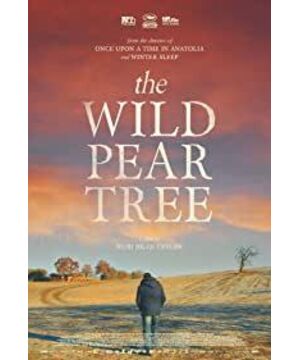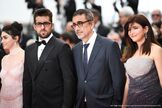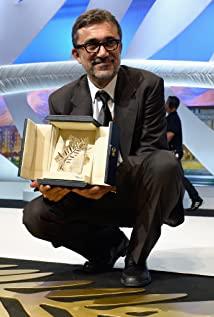Director-only centralism is just as narrow as author-only centralism.
I like to discuss things on a case-by-case basis, and I don't choose any director because of likes and dislikes. Everything is based on the body of the work. Good is good, bad is bad, or between good and bad, you can comment. Of course, a good director, no matter how bad it is, will be better than a mediocre director. The problem is that we often go astray, and we always think that a movie made by a good director, no matter what the work itself is, takes it for granted that it is good. The stubbornness and stubbornness in human nature, and the fallacy of disregarding the objective, arise from this.
Fortunately, Nuri Big Ceylan's new work "Wild Pear Tree" is not that bad, and of course, it is not that good, and it belongs to the same routine as the previous "Hibernation". That is to say, compared with the earlier films such as "Distant", these two films show the infinite possibilities of the director, and also show that the direction of the film has become confusing. It's not so pure, and it's still a little far from my expectations for his movie. As far as its mirror language is concerned, there is no doubt that I prefer the simple art of "Distant". How I hope he can make another intriguing movie like "Distant". The subtle narrative is hidden and blank everywhere, so that the movie has infinite possibilities and more poetic implications.
Undoubtedly, "Hibernation" and "Wild Pear Tree" are more like novels. The richness of Chekhov's novels, mixed with Rohmer's ramble, and implied by Tarkovsky's poetic mirror language, constitute Ceylon The film style is reflected in the cluster leakage of mirror language density, and the unique style between the Anatolian Plateau and the Canakkale Strait is continuously explained in front of the camera. That is to say, only by changing the pure poetic images of the past and adopting a novel-style narrative method can he reach his deepest feelings about reality. This is an adventurous journey. Obviously, the director is trying some new lens language. For example, through editing, the previous picture jumps into the next one quickly, making the connection a bit abrupt. This neat brittleness is somewhat anti-Ceylon style.
Then there are more dialogues, far beyond "Hibernation", I am afraid that if you add up the dialogues of all his films before "Distant", there are not as many as "Wild Pear Tree". This is the application of the narrative of the novel, taking the medicine according to the prescription without hindrance, focusing on strengthening the conflict between the character's character and reality, and increasing the contradictions. But this runs counter to the true art of cinema, and it also takes care of one and the other. What is a good movie, you can say less if you can say less, you must make good use of mirror language, and use it to the extreme, it is exquisite. Fortunately, the director did not completely lose the original poetry. As far as its deep focus is concerned, it is as beautiful as ever. It seems that we can hear the tumbling of wheat waves and the rustling of leaves blowing in the wind at any time.
Interestingly, Xinan, who returned home after graduating from college, looks a bit mature, out of touch with the innocence of traditional college graduates, full of resentment, and likes to harass people. Often when discussing with people, I feel trapped in a self-imposed cage, making the other person uncomfortable and even angry. This is a "bet" made by a young man in the face of the confused reality, because he wants to publish his novel "Wild Pear Tree", which needs money, and he can only look everywhere, like a "buzzing" fly. In order to publish a book, he successively sought out the mayor and a wealthy boss, but he ran into obstacles everywhere, and he was unpleasant everywhere. There is a scene in the film, when he is depressed, he looks back at the dog, like a lost dog. In this way, there is a reason why he became chatty. The director must have set it here.
The interesting part of the dialogue is the fifteen-hour dialogue between Sinan and local writers in the bookstore. There are portraits of writers such as Marquez and Kafka on the wall of the bookstore. The conversation goes from being mild to the smell of gunpowder, and the location, from the bookstore to the bridge, until the writer is provoked. The writer said why are you talking to me like this. Sinan said everyone releases pressure on others. The writer said, this is Turkey, you have to learn to adapt, and I will refuse the Nobel Prize. Xinan walked away with a "hum", and the camera quickly jumped to the next meeting between the two. At this time, when the writer saw Xinan, he felt a sense of resistance, like seeing the god of plague. Status and fame make their dialogue extremely asymmetrical.
Xinan's novel "Wild Pear Tree", which is about the hometown, seems to be between fiction and non-fiction through his narration. The writing itself shows that the guy has something to say, mainly about the various views between tradition and modernity. If this is just a thought, it is still far from the real thought, and it is likely to become an emotional catharsis. After that, the two transitional conversations between Sinan and Imam Nazmi and others were particularly evident. As another kind of confrontation, this conversation lasted for twenty minutes, starting with the headmaster stealing an apple. The three chatted while walking, and the vision opened up their inner distance. As a young man with a modern education, Xinan felt angry and helpless for the imprisoned and conservative young people in his hometown, but this is an unchangeable reality. In the end, Sinan had to say to them, what am I going to change.
Between mother and son, this may be the only point Sinan doesn't want to provoke. But the son also said mother, you have to endure sweet bitterness. Mother sadly said she couldn't communicate with you, you were always straight to the point. My mother numbs herself with TV soap operas, presumably most people on the planet do, as does her sister Yassamine, a downplayed character. When the son took out the published "Wild Pear Tree" from the bag, the mother took it and said "To my dearest mother, all credit to you." The mother cried. The reason why my mother was moved was not only because of the book, but more importantly, her years of hard work did not seem to have been in vain. Of course, she also felt a little sad for the embarrassing situation of being a nanny and taking care of babies in reality. All because of a gambling husband.
As for Sinan's hard-to-publish book, he failed to sell a single book until he returned home from the army. The owner of the bookstore said that it was removed from the shelves after a few months of display. Xinan came to the strait where the roaring waves roared, in the same lonely state of mind as Uzak in "The Distance". Thinking about it, Xinan, who always likes to complain, is not pleasing to the eye everywhere, and even has to deal with others, slowly becomes dumbfounded in front of reality. The ideal meets the reality of shattering.
It gives me the general feeling that the young man Sinan is sympathetic, but not likable. I always feel that the director is a bit detached from the surface for this character, without really going deep into his heart, digging out his most worrying and painful side, but only through shallow narratives to advance his unbearable reality. This may be related to fast cutting. In other words, the director just wanted to present an immature Xinan, a young man with a naive heart. In a rapidly changing world, there are always places of relative slowness, such as those bound by tradition and religion. But young people's hearts are in tune with the changes in the world, and they can't help themselves.
What impressed me the most was that Xinan met Heidis, a high school female classmate. Her beauty, her initiative, and Xinan's incomprehensible style and indifference formed a sharp contrast. Heidis was overjoyed to see him. This is a cheerful and decisive girl. To avoid suspicion, she said give me a cigarette and come with me. The two were leaning against a thick tree. She looks forward to depicting, I look forward to sailing in the distance, bright streets, love struck by lightning, even if it rains together. The wind blew the leaves, and her heart was crying. You could see his unease and hesitation. She said sadly, when my heart speaks, I have to leave, I am married to Jin Coin (who), a jeweler. She asked if there were scorpions under the gold. The girl hopes that the guy will say no, I hope you will marry me. But he was like a wilted bear, not showing the slightest sign.
I thought this was the biggest highlight of the film. Without this scene, this poetic and sad situation, the film would be boring. It is precisely because of this amazing girl that the movie becomes full of fun, but it is an irreversible secret emotion. The boy's stupidity and indifference made the girl deeply disappointed, and she was even more determined to marry Jin Coin. Does the guy love her? He may have been moved, at least at that moment, but he still did not express his eager love for her confession of love, or even for the kiss between the two. Her mother shouted from a distance, and it ended up being the last chapter of this affair. The girl's decisive departure also made us not have any good expectations for Xinan's life. What a foolish life this is, and a test of the chaotic reality.
Of course, the main theme of the film is the interaction between Sinan and his father Idris. The father, an elementary school teacher, is a multi-faceted figure with a big heart, a kind heart, and a hip-hop cynical mentality. He likes to dig wells on the slopes of the village on weekends. At the same time, he was heavily in debt due to his obsession with gambling. This is also the main reason why his son resents him. His father's dog, Alxa, was his lifeblood. Even if he owed Muharrem's gold, the man offered to use Alxa as a mortgage, but his father was unwilling. Only that night, Xinan found out that the money was three hundred less and shouted. He didn't know who took it. It could also be a way for him to vent his dissatisfaction with his father's gambling addiction.
As a result, the conflict between father and son runs through the film throughout. When the father and son dug the well, Sinan said, writing is not bound by any religion, I don't want to rot here, people here are narrow-minded, we are all dangling in a glass of water, myth and reality, abstract and concrete combine, no People think of themselves as pure as pure snow. Sinan told his mother about his father, and his life was basically a rebellion against absurd things. The father must have thought the son was rhetoric. Later, when Sinan came to the classroom and saw what his father was writing, he publicly accused him of playing the lottery. The father came home and told his son that you sentenced me without trial. The father, who has always been gentle and accommodating, was angry this time. In fact, at that time, he was just writing a "dog search notice" because his pet dog was lost and his soul was gone.
The dialogue between father and son is not about communication at all. As the writer said, this is in Turkey, but to be fair, the father is a pretty good man besides gambling. Or to put it in reverse, the son cannot bring any "energy" to the father, but only makes him worried and annoyed. His father wanted him to pass the exam and stay as a teacher. Reality always teaches Sinan more. The fact is that only when the son joined the army and returned home after retiring, did father and son reach an apparent reconciliation. A rebellious heart can only succumb to the cruel reality, which is the life of an ordinary person. The life that goes through the motions is like an endless circle, and it will always go to the end of life. All thoughts and ideals are just a consolation, and have no practical value.
After all, for Xinan, the reality is farther than the distance, and when there is no way to go, he can only return to the place of birth. Although there is a little baby under the pear tree, it is just a fairy tale dream, but who can return to the innocent childhood. The wild pear tree is not just a tree, but an elusive image, or a materialized symbol between reality and tradition.
The novel "Wild Pear Tree" and the movie "Wild Pear Tree" constitute an inextricably intertwined connection, like the opposite of a mirror. It looks like a dead father with ants crawling all over his body, but it is a real reality that is hard to cover. Xinan, who was hesitant, was about to leave the well, but he returned to the slope that used to be green. For my father, it really doesn't matter if there is a drop of water in the never-ending well, because he always believes in the ideal of spring. The snow was flying like a dream. Xinan went down to the bottom of the well and was still digging the unfinished well. The father standing on the edge of the well was very happy. Following in the footsteps of his father, we seem to have seen Xinan's straight life come to an end.
2018.12.30
Please pay attention to the film critic's official WeChat account "Classic Light and Shadow Manual"
View more about The Wild Pear Tree reviews











